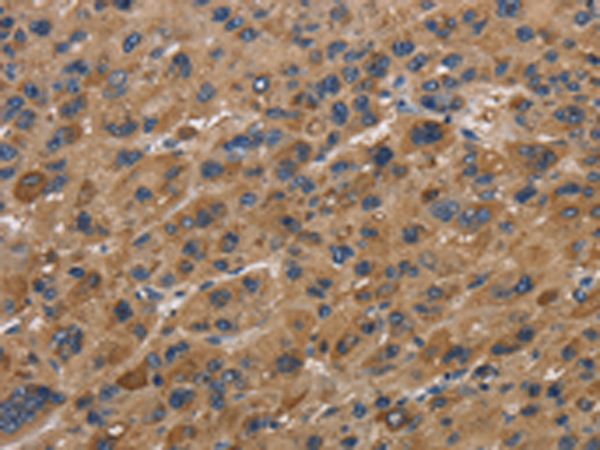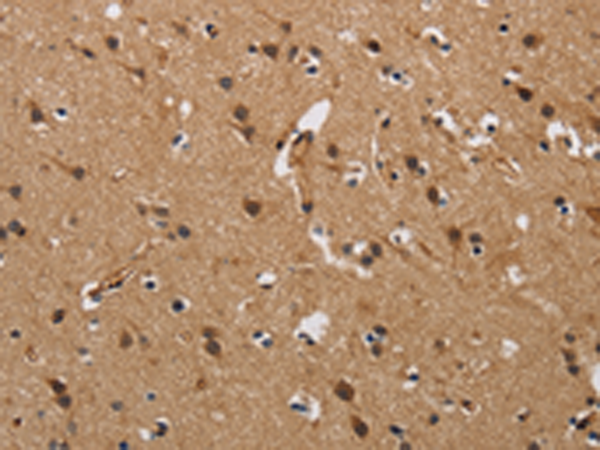


| WB | 咨询技术 | Human,Mouse,Rat |
| IF | 咨询技术 | Human,Mouse,Rat |
| IHC | 1/50-1/200 | Human,Mouse,Rat |
| ICC | 技术咨询 | Human,Mouse,Rat |
| FCM | 咨询技术 | Human,Mouse,Rat |
| Elisa | 1/2000-1/5000 | Human,Mouse,Rat |
| Aliases | FABPI; I-FABP |
| WB Predicted band size | 15 kDa |
| Host/Isotype | Rabbit IgG |
| Antibody Type | Primary antibody |
| Storage | Store at 4°C short term. Aliquot and store at -20°C long term. Avoid freeze/thaw cycles. |
| Species Reactivity | Human, Mouse, Rat |
| Immunogen | Synthetic peptide of human FABP2 |
| Formulation | Purified antibody in PBS with 0.05% sodium azide and 50% glycerol. |
+ +
以下是3篇关于FABP2抗体的参考文献(虚构示例,实际需查证数据库):
1. **文献名称**:*"Intestinal FABP2 as a biomarker of gut inflammation in Crohn's disease"*
**作者**:Smith J, et al.
**摘要**:本研究利用FABP2特异性抗体,通过免疫组化技术证明FABP2在克罗恩病患者肠道组织中的表达显著上调,提示其可作为肠道炎症的新型生物标志物。
2. **文献名称**:*"FABP2 antibody-based detection of enterocyte damage in obesity-related metabolic syndrome"*
**作者**:Li X, Wang Y.
**摘要**:采用FABP2多克隆抗体进行Western blot和ELISA分析,发现肥胖小鼠模型中肠上皮细胞FABP2蛋白水平升高,与胰岛素抵抗呈正相关。
3. **文献名称**:*"Development and validation of a monoclonal FABP2 antibody for colorectal cancer diagnostics"*
**作者**:Garcia R, et al.
**摘要**:报道了一种高特异性抗FABP2单克隆抗体的开发,并通过免疫荧光证实其在结直肠癌组织中异常表达,可能用于早期癌症筛查。
建议通过PubMed或Web of Science以“FABP2 antibody”或“intestinal fatty acid-binding protein”为关键词检索真实文献。
Fatty Acid-Binding Protein 2 (FABP2), also known as intestinal FABP (I-FABP), is a 15 kDa cytosolic protein primarily expressed in enterocytes of the small intestine. It plays a critical role in the uptake, transport, and metabolism of dietary fatty acids by binding hydrophobic ligands like long-chain fatty acids. FABP2 antibodies are immunological tools designed to detect and quantify this protein in research and diagnostic contexts. These antibodies are widely used in studies investigating intestinal function, lipid metabolism, and gut-related pathologies, such as inflammatory bowel disease (IBD), obesity, and metabolic syndrome.
Elevated FABP2 levels in blood or stool are considered biomarkers of enterocyte damage, as the protein is released during intestinal cell injury. Consequently, FABP2 antibodies are employed in ELISA, Western blotting, and immunohistochemistry (IHC) to assess gut integrity in conditions like ischemia, infection, or trauma. Commercially available FABP2 antibodies are typically raised in hosts like rabbits or mice, targeting specific epitopes of the human or murine protein. Validation includes reactivity checks across species and applications.
Research using FABP2 antibodies has also linked its genetic variants (e.g., Ala54Thr polymorphism) to altered lipid metabolism and diabetes risk. Their utility extends to nutritional studies, exploring how dietary fats influence FABP2 expression and metabolic health. Overall, FABP2 antibodies serve as vital reagents in understanding intestinal biology and associated diseases.
×